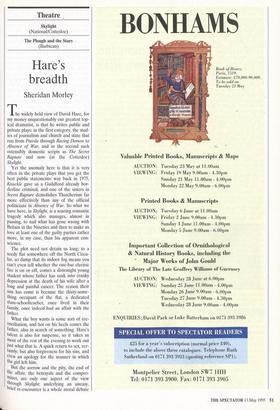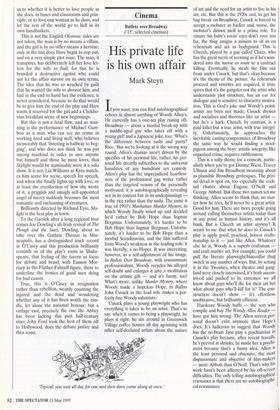Theatre
Skylight (National/Cottesloe) The Plough and the Stars (Barbican)
Hare's breadth
Sheridan Morley
The widely held view of David Hare, for my money unquestionably our greatest top- ical dramatist, is that he writes public and private plays: in the first category, the stud- ies of journalism and church and state that run from Pravda through Racing Demon to Absence of War, and in the second such ostensibly domestic scripts as The Secret Rapture and now (at the Cottesloe) Skylight.
Yet the anomaly here is that it is very often in the private plays that you get the best public statements: way back in 1975, Knuckle gave us a Guildford already bor- derline criminal, and one of the sisters in Secret Rapture demolishes Thatcherism far more effectively than any of the official politicians in Absence of War. So what we have here, in Skylight, is a soaring romantic tragedy which also manages, almost in passing, to nail what has gone wrong with Britain in the Nineties and then to make us love at least one of the guilty parties rather more, in my case, than his apparent con- science.
The plot need not detain us long: to a seedy flat somewhere off the North Circu- lar, so damp that its indoor fog means you can't even tell whether the one-bar electric fire is on or off, comes a distraught young student whose father has sunk into cranky depression at the death of his wife after a long and painful cancer. The reason their son has come is because the thirty-some- thing occupant of the flat, a dedicated slum-schoolteacher, once lived in their family, once indeed had an affair with the father.
What the boy wants is some sort of rec- onciliation, and hot on his heels comes the father, also in search of something: Hare's talent is also for suspense, so it takes us most of the rest of the evening to work out Just what that is. A quick return to sex, cer- tainly; but also forgiveness for his sins, and even an apology for the manner in which the girl left him.
But the sorrow and the pity, the end of the affair, the betrayals and the compro- mises, are only one aspect of the view through Skylight; underlying an uneasy, brief re-encounter is a whole moral debate as to whether it is better to love people as she does, in buses and classrooms and prin- ciple, or to love one woman as he does, and let the rest of the world go to hell in its own handbaskets.
This is not the English Oleanna: sides are not taken, the man is by no means a villain, and the girl is by no other means a heroine: only at the last does Hare begin to cop out, and on a very simple plot issue. The man, it transpires, has deliberately left her love let- ters for the wife to find: for this he is branded a destructive egotist who could not let the affair survive on its own terms. The idea that he was so wracked by guilt that he wanted the wife to divorce him, and had in the end to hand her the evidence, is never considered, because to do that would be to give him the end of the play and Hare wants it reserved for the girl and a Chekho- vian breakfast scene of new beginnings.
But this is not a fatal flaw, and so stun- ning is the performance of Michael Gam- bon as a man who can see no crime in working hard and living well, who believes memorably that 'listening is halfway to beg- ging', and who does not think he was put among mankind in order to save anyone but himself and those he most loves, that Skylight would be unmissable were it a solo show. It is not. Lia Williams as Kyra match- es him scene for scene, speech for speech, and when she finally lights up with love, or at least the recollection of how she wrote of it, a priggish and smugly self-appointed angel of mercy suddenly becomes the most romantic and enchanting of creatures.
Brilliantly directed by Richard Eyre, Sky- light is the best play in town.
To the Garrick after a long regional tour comes Joe Dowling's all-Irish revival of The Plough and the Stars. Dowling, about to take over the Guthrie Theatre in Min- neapolis, has a distinguished track record in O'Casey and this production brilliantly reminds us of the play's roots in Shake- speare, that feeling of the tavern as focus for debate and brawl, with Eamon Mor- risey as the Fluther-Falstaff figure, there to underline the ironies of good men dying for bad causes.
True, this is O'Casey in resignation rather than rebellion, wearily counting the injured and the dead and wondering whether any of it has been worth the can- dle, let alone the national honour: but a vintage cast, precisely the one the Abbey has been lacking this past half-century since John Ford took the best of them off to Hollywood, does the debate justice and then some.



































































 Previous page
Previous page